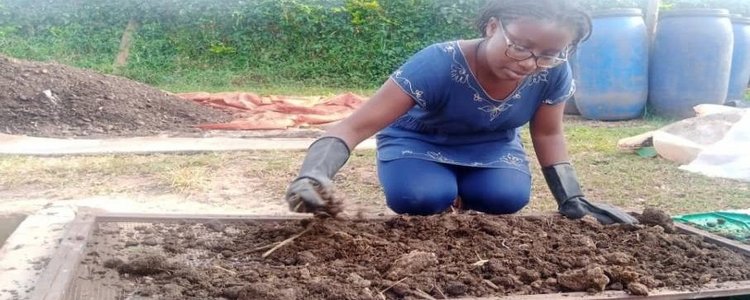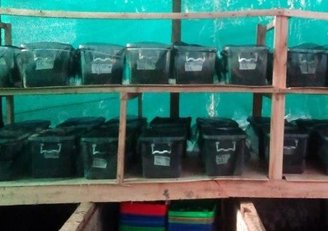Makerere University (MU) has managed to enroll all of its student researchers with a fairly decent gender balance: 4/10 enlisted students are female. Each student has made progress on their prospective research proposals, with some of them being accepted already and enrolled for their program of study. Three or four of the students have even started with their proposed research. One of these students is Elias Oyesigye from the Mbarara University of Science and Technology (MUST). He has started analysis on maize soils for his PhD. Black soldier fly larvae composting studies have already started via Agnes Nalunga (master’s student) and Jonath Manirakiza (bachelor’s student), with the intent of analyzing the resulting compost and scaling up the process for the Imvepi Refugee Settlement. In cooperation with URCS, a team of MU researchers have made an initial visit to Imvepi to collect fecal sludge and fecal sludge product samples for initial analysis to inform further stages of research.
Aside from playing host to MU researchers, the URCS has been busy managing and optimizing processes within the newly established and operational Waste Management Center (WMC) in Imvepi, which is managing much of the solid waste and fecal sludge within the settlement of more than 70,000 inhabitants. This includes desludging pit latrines throughout the settlement and transporting the sludge to the WMC. The same applies to solid waste from the Imvepi marketplace. Additional activities include production of fuel briquettes and fertilizer for select fruit orchards from dried, sanitized fecal sludge, which may be the subject of further studies by MU.
TU Wien, the coordinating institution, has successfully enrolled its APPEAR scholarship holder and PhD candidate, Francis Okori. He has visited, observed, and deliberated with stakeholders at 9 of 11 CDM compost facilities in Uganda, providing the basis for the sampling campaign that TU Wien will conduct in the second project year. Additionally, TU Wien has been coordinating all project partners via consistent lines of communication (monthly team meetings), active troubleshooting (individual consultations when problems arise), and consistent recordkeeping (meeting minutes, archive of emails, etc.), even in the wake of multiple staff changes.

